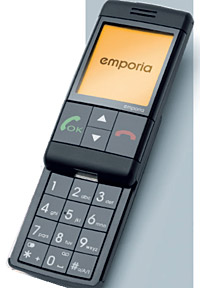 On display at the CeBit hi-tech fair last week was a new mobile phone offering a built-in emergency button.
On display at the CeBit hi-tech fair last week was a new mobile phone offering a built-in emergency button.
Designed for older folks, the Life mobile phone gets rid of all the usual multimedia razzmatazz and bells’n’whistles in preference for a no-nonsense, back-to-basics handset that should prove simpler to use for the technologically challenged.
The stripped down dual band phone comes with a big 2.7in (6.8cm) monochrome screen matched by over-sized buttons designed to be read by people with failing sight.
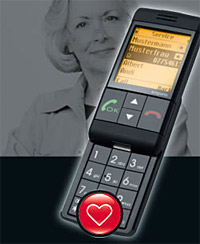 The phone comes with extra loud volume options for speaker and ring tones and has a powerful vibration alert to ensure the owner knows that someone’s calling.
The phone comes with extra loud volume options for speaker and ring tones and has a powerful vibration alert to ensure the owner knows that someone’s calling.
For added security, there’s a big emergency red button on the back which can be programmed to call a designated number for help and send off a pre-written text message.
The Life phone has been created by the Austrian firm Emporia, who have started developing simpler phones aimed at the older generation.
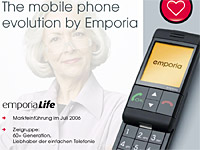 There seems to be some debate about just how old the target market actually is: the MatureMarket.com website (for “seniors & Baby boomers worldwide”) had it pegged as a phone targeted at the over 40s. The BBC reckoned it was for over the over 50s, while the manufacturers own site had it pegged for even older people, “the 60+ generation.”
There seems to be some debate about just how old the target market actually is: the MatureMarket.com website (for “seniors & Baby boomers worldwide”) had it pegged as a phone targeted at the over 40s. The BBC reckoned it was for over the over 50s, while the manufacturers own site had it pegged for even older people, “the 60+ generation.”
 WebEx is listed on the NASDAQ (WEBX) and is reported to be the leader in its field. They offer a ton of different products, all based around sharing information between a number of remote parties, with the majority of them featuring shared video.
WebEx is listed on the NASDAQ (WEBX) and is reported to be the leader in its field. They offer a ton of different products, all based around sharing information between a number of remote parties, with the majority of them featuring shared video. Her guidance to them is to settle on DVB-H (Digital Video Broadcasting for Handhelds), a European led development of the DVB-T (Television) standard that is throughout large areas of Europe.
Her guidance to them is to settle on DVB-H (Digital Video Broadcasting for Handhelds), a European led development of the DVB-T (Television) standard that is throughout large areas of Europe. Despite a
Despite a  HDForAll are a pressure group made up of TV manufacturers, retailers and public service broadcasters including DSGI, Samsung, Sony and Toshiba and BBC, ITV, Channel 4 and Five. They’re keen to remind people that there’s only a limited amount of time left to contact Ofcom to make their views known on auctioning off spectrum to the highest bidder. Background on this and how to respond are available on
HDForAll are a pressure group made up of TV manufacturers, retailers and public service broadcasters including DSGI, Samsung, Sony and Toshiba and BBC, ITV, Channel 4 and Five. They’re keen to remind people that there’s only a limited amount of time left to contact Ofcom to make their views known on auctioning off spectrum to the highest bidder. Background on this and how to respond are available on 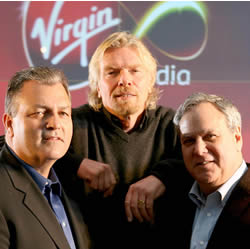 The upload speed will also be upped to 768Kbs, not exactly setting the uploading world alight, but better than a poke in the eye with a stick, non?
The upload speed will also be upped to 768Kbs, not exactly setting the uploading world alight, but better than a poke in the eye with a stick, non?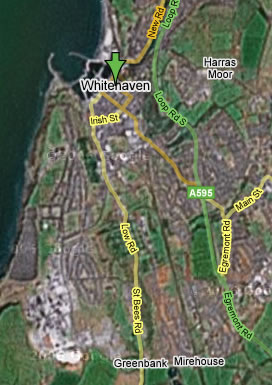 It’s quite an interesting approach that’s worthy of a little attention, especially as this will form the basis for the approach for the rest of the UK.
It’s quite an interesting approach that’s worthy of a little attention, especially as this will form the basis for the approach for the rest of the UK.
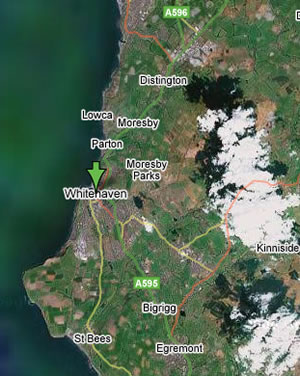 Back in June last year, we heard that
Back in June last year, we heard that 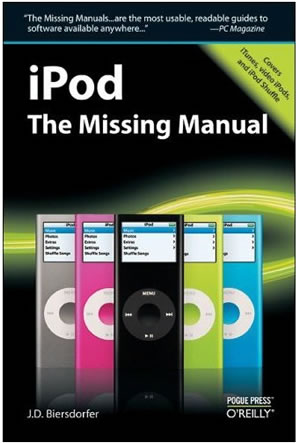 Although most of the information can be had elsewhere, it’s useful to have a single source where everything’s in one place. Forgotten how to reset your iPod? It’s in the Missing Manual.
Although most of the information can be had elsewhere, it’s useful to have a single source where everything’s in one place. Forgotten how to reset your iPod? It’s in the Missing Manual. Sanity appears to have been reached by Vodafone, as they announce a flat-rate of €12/day for data in Europe – but only if accessed from “mobile-enable laptops” from 1 July 2007. It will replace their current per Megabyte service, giving what they say is “practically unlimited data usage,” which is actually up to 50Mb/day.
Sanity appears to have been reached by Vodafone, as they announce a flat-rate of €12/day for data in Europe – but only if accessed from “mobile-enable laptops” from 1 July 2007. It will replace their current per Megabyte service, giving what they say is “practically unlimited data usage,” which is actually up to 50Mb/day. As if the life of the portable music player listener isn’t
As if the life of the portable music player listener isn’t 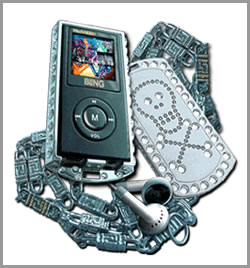 There’s two models available DOGTAG or SKULL’N’BONES, which MediaReady tell us creates “a new kind of fashion statement.”
There’s two models available DOGTAG or SKULL’N’BONES, which MediaReady tell us creates “a new kind of fashion statement.”